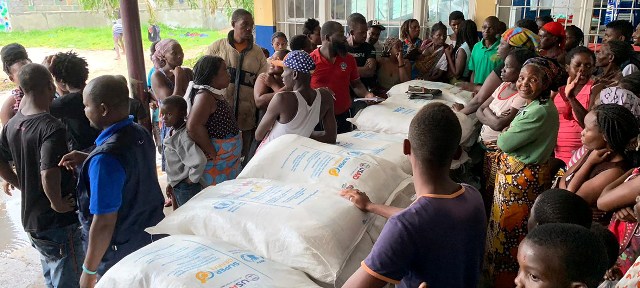 Food distribution in Beira, Mozambique [source UN/WFP/Deborah Nguyen].
Food distribution in Beira, Mozambique [source UN/WFP/Deborah Nguyen].
More than 1,000 people are feared dead after Tropical Cyclone Idai devastated Mozambique, Malawi and Zimbabwe. Winds at speeds of 200kph and floodwaters up to six metres deep affecting an estimated 2.6 million people. Aid organisations have been scrambling to respond to what the United Nations described as one of the worst weather-related crises ever in the southern hemisphere.
Rescue workers described seeing people on rooftops or clinging to trees surrounded by kilometres of water. One survivor in the Mozambican port of Beira said iron-sheet roofs torn off shacks had decapitated victims. As a storm surge inundated the hinterland, Beira became an ‘island in the ocean’. The Red Cross could get only one lorry containing tarpaulins and water-purification tablets into the city of 500,000 people before it was cut off. Telephone poles and trees have been submerged, with roads and bridges completely swept away or left with impassable sinkholes. ‘Sometimes we can only save two out of five; sometimes we rather drop food and go to someone else who’s in bigger danger,” Ian Scher, of the organisation Rescue South Africa, told AFP. ‘We just save what we can save and the others will perish.’
Mozambique’s president, Filipe Nyusi, declared a state of emergency and described seeing bodies floating in rivers as he flew over the region by helicopter. ‘It’s a real humanitarian disaster of large proportions,’ he said. In an address on national radio, Nyusi said that while the official death toll was 84, ‘everything indicates that we can have a record of more than 1,000 dead,’ CNN reported.
Jamie LeSueur, of the International Federation of Red Cross and Red Crescent Societies (IFRC), said: ‘The scale of devastation is enormous. It seems that 90% of the area is completely destroyed … Beira has been severely battered. But we are also hearing that the situation outside the city could be even worse. Yesterday, a large dam burst and cut off the last road to the city.’ By 19 March, the Washington Post reported, there were fears that the town of Buzi, a town of 200,000 people, might be completely submerged.
After sweeping through Mozambique, Cyclone Idai weakened but continued westwards to Zimbabwe as a tropical storm, wreaking havoc in the Chimanimani and Chipinge districts of Manicaland. At least 89 deaths have been reported in Zimbabwe, with more than 100 missing. Herve Verhoosel, of the UN World Food Programme, said 920,000 people were estimated to be affected in Malawi, with 56 deaths and some 600 injuries declared so far.
Mozambique is particularly vulnerable to weather-related disasters – a World Bank agency, the GFDRR, has ranked Mozambique third among African countries most at risk. In an early assessment of the damage, after Idai made landfall on 14-15 March, the UN Office for the Coordination of Humanitarian Affairs warned of might follow in its wake: a food security and nutrition crisis following the devastation of 168,000 hectares (650 sq miles) of crops already inundated by heavy rains earlier in the month, heightened risk of water-borne diseases because of the loss of water supplies and sanitation, and protection risks for women and children in particular.
‘There’s a sense from people on the ground that the world still really hasn’t caught on to how severe this disaster is,’ said the IFRC’s Matthew Cochrane. Clare Nullis, of the World Meteorological Organization, said: ‘If these reports, these fears are realised, then we can say that this is one of the worst weather-related disasters – tropical cyclone-related disasters – in the southern hemisphere.’
But we can’t say we were not warned – 19 years ago, Cyclone Eline also made landfall near Beira after intense rain, killing nearly 800 and displacing 650,000 across the region. A woman saved after giving birth in a tree above crocodile-infested waters became the human face of that disaster. The baby is now an adult and the threat to the world from climate change has also matured: the worst fears of how it will impact countries struggling to develop are becoming reality.



